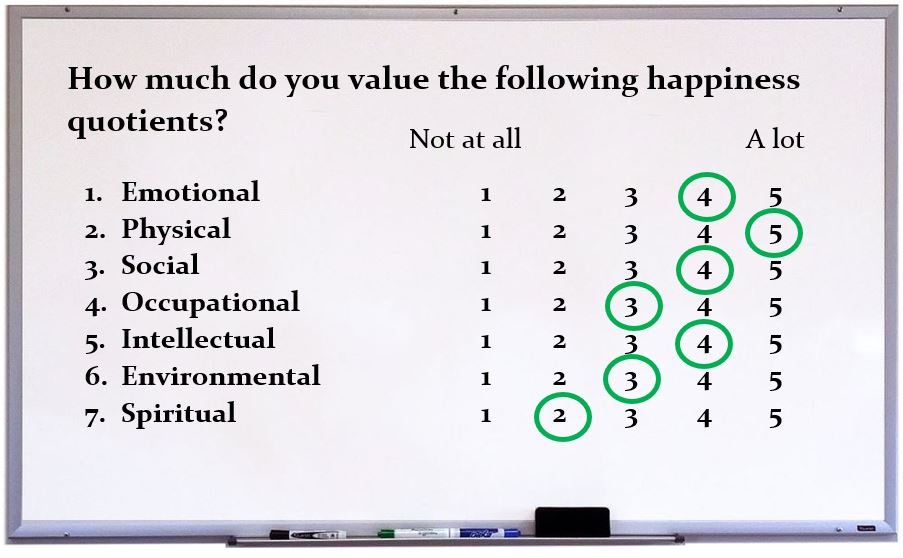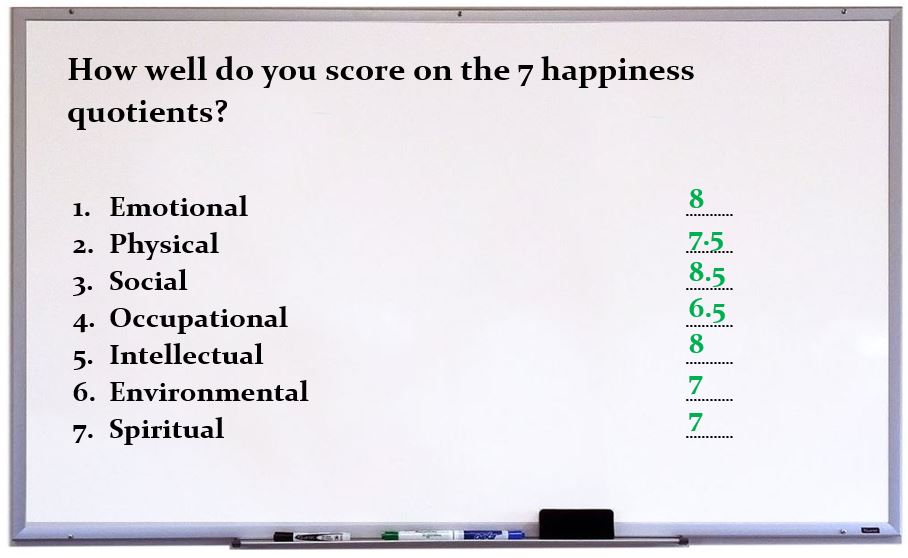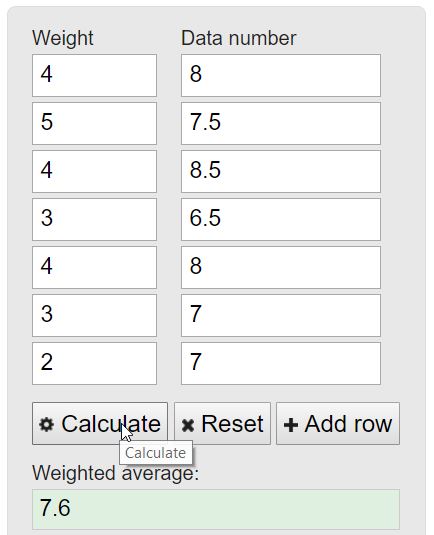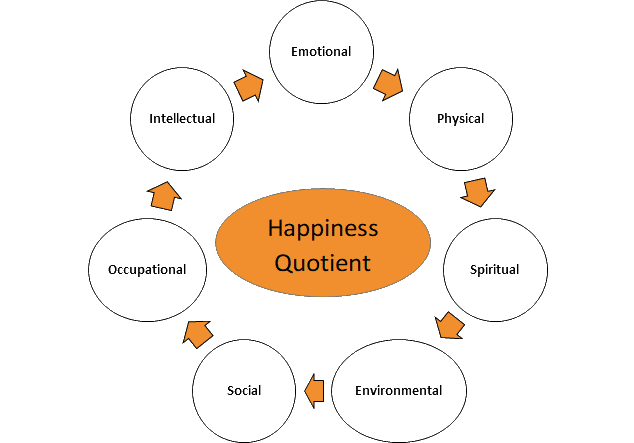The happiness quotient is a model that makes it easier for people to objectively judge their own happiness on multiple aspects. These aspects are called happiness quotients. In total, there are 7 quotients which together form the happiness quotient:
- Emotional happiness
- Physical happiness
- Social happiness
- Occupational happiness
- Intellectual happiness
- Environmental happiness
- Spiritual happiness
This article covers these 7 happiness quotients, and how you can learn from them. If you want to get a better feel for your happiness, I challenge you to judge each of these 7 happiness quotients in the test at the end of this article!
Before you start, you should know that you can value each happiness quotient as much as you like. There are some quotients that I value more over others, and that’s okay.
If you’re here only for one of the happiness quotients, use the table of contents below to jump down to the section you’re looking for!
Contents
Emotional happiness quotient

Happiness starts with your emotions.
Or at least, it does for me. If we master our own emotions, then we are more likely to actively control our own happiness.
You see, it turns out happiness is not just a result of the things that happen around you. In fact, happiness is much more dependent on your own emotional mindset.
Positive psychologist Sonja Lyubomirsky went as far as to say that happiness is determined as follows:
- 50% determined by genetics
- 10% determined by external factors (a.k.a. happiness factors)
- 40% determined by your own personal outlook, otherwise your own emotional happiness quotient.
This is why I try my best to remain optimistic and self-aware, especially since the world is only becoming more and more hectic. I focus on the things that I actually have control over.
Physical happiness quotient

Good health is one of the most important happiness quotients.
Year after year, the World Happiness Report shows us that a long and healthy life is highly correlated with the Happiness Index.
And it’s exactly the same for me personally. It’s rather straightforward. A lot of my worst days happened on days where I didn’t feel healthy. But for me, the physical happiness quotient goes beyond just being healthy.
Challenging my body has a great positive effect on my happiness. It’s the reason why I love running so much. In fact, I’m about to run my 5th marathon in April 2019! Being healthy is extremely important for my happiness, but I can really push it further when I go out for a long run. The feeling of my intense exercise has a great effect on my happiness.
This is why I value the physical happiness quotient so much.
Social happiness quotient

They say happiness is only real when shared.
And I believe this is true, or at least to some degree.
I consider myself to be an introvert. There’s only a finite amount of energy that I can get from social interacting. Extraverts generally tend to extract much more energy from being social.
But I am still the happiest on days that I spend with friends, family and my girlfriend. It’s why I usually see an increase in happiness during the Christmas period. My birthday is also a great example of this. Being around others generally has a positive influence on our happiness.
And that’s what the social happiness quotient is about.
If you value social interactions a lot, then you should try your best to stimulate this happiness quotient as much as possible.
Occupational happiness quotient

Most of us spend about 25% of our lives in an office or at work. Do the math: 40 hours a week is a big chunk, and that probably excludes your commute, overtime and getting ready.
It’s therefore increasingly more important that your occupation is something that is pleasant and endurable. Better yet, for some lucky people amongst us, work is actually something that brings happiness to their lives.
Most people are not as lucky though.
A survey by Mental Health America with over 17,000 respondents shows that only 21% of people in the US feel like they are paid enough at work. In fact, a lot of people simply hate Mondays, just for the simple fact that it’s the start of a new workweek.
If you value your occupational happiness but aren’t feeling happy at work, then you should definitely reconsider your career path. It’s never too late to make a change!
Intellectual happiness quotient

For some people, the intellectual happiness quotient is closely related to the occupational happiness quotient. These people are the minority since we just found out that only a fraction of people find true happiness in what they do at work (their occupation).
However, most people have to find their intellectual happiness somewhere else.
It’s very important that you find some kind of intellectual satisfaction from other sources. Something that triggers your mind. Some kind of challenge that you can look forward to. The proverbial mountain that you want to climb. Something that actually gives you satisfaction and that you can be proud of. In short: something that makes you want to wake up in the morning!
For some people, this satisfaction is gained by traveling. For others, this intellectual itch is satisfied by learning another language. Some other examples are playing, writing and recording music, writing stories, painting, budgeting, gardening, or solving a Rubik’s cube.
It doesn’t really matter what it is, as long as you find something that you find intellectually satisfying!
Speaking personally, I get a lot of intellectual satisfaction from creating this website!
Environmental happiness quotient

This happiness quotient might be a little harder for some to grasp. You can get a feeling of how much you value this quotient by asking:
Are you happy about the environment in which you live, and do you feel like you have a positive influence on it?
If the answer to this question is positive, then the environment itself – and your influence on it – has a positive influence on your happiness.
Are you proud to drive an electric vehicle? Are you happy because you live in an energy-neutral house? Or do you spend your weekends de-trashing your local park?
These are all great ways to satisfy your environmental happiness quotient!
Personally, I sometimes get annoyed by all the trash that people just litter around. That’s why I sometimes pick up trash during my runs. Even if it’s only a single plastic bag, knowing that I positively influence my environment has a great effect on my happiness. 🙂
Spiritual happiness quotient

The spiritual happiness quotient is not just about religion. It’s also about feeling true with yourself.
Therefore, this happiness quotient can be just as important to an atheist as to a Christian or a Muslim.
Feeling true to yourself starts and ends with your spiritual happiness. If you value this happiness quotient, then you should be aware of the things that you value most. What inner purposes do you connect the most to, and how much can you steer your life in the best direction based on these values?
The spiritual happiness quotient comes down to feeling at peace with your inner beliefs and who you really are.
Now that you know what the 7 happiness quotients are, it’s time for the next logical step. I’m going to show you how you can test your own happiness quotients!
Test your own happiness quotient in this questionnaire
Every human being on this planet is unique. We all value happiness quotients differently.
Therefore, you and I don’t share the same values and beliefs. In fact, your interpretation of the happiness quotients might be totally different from mine!
Just because I get a lot of happiness from challenging myself physically doesn’t mean that you necessarily have to as well!
I’ve developed the following happiness quotient test that you can use to really dive into what makes you happy!
It’s really easy. It’s based on 2 simple steps:
- Determine how much you value each happiness quotient
- Determine how well you “score” on these happiness quotients, based on a scale from 1 to 10.
How much do you value your happiness quotients?
You first have to determine how much you value the different happiness quotients.
For example, if you’re already retired, you might not even have an occupation by definition. Therefore, your occupational happiness quotient could be valued a lot lower than, say, your social happiness quotient.
Also, some people simply don’t care too much about the environment. Those people might value their physical happiness much more over their environmental happiness.
So the first step is to determine how much you value your happiness quotients. Try to answer this question:
How much do you value the following happiness quotients?
- Emotional
- Physical
- Social
- Occupational
- Intellectual
- Environmental
- Spiritual
Try to answer this question on a simple scale from 1 to 5, where 1 means “not a lot” and 5 means “a lot!”.
Here’s an example of how I answered this question myself:

How well do you score on the 7 happiness quotients?
The second step in this happiness quotient test is easier.
I want you to rate your happiness on these 7 quotients. I’d advise you to use a scale from 1 to 10.
Why? Because it’s simple, intuitive, and used in a lot of other happiness studies as well! But more importantly, don’t think too hard about it. Try to follow whatever your gut says. It’s usually right. 😉
Try to answer this question:
How well do you score on the 7 happiness quotients?
Again, I’ve personally filled in this second step as well.

Based on the results of this happiness quotient test, you should be able to calculate the weighted average of your scores. How can you do this?
By filling in an online weighted average calculator. Or, if you know how you can do it yourself!
Here’s my result, based on the examples above.

So the weighted average score of my happiness quotients is 7.6, which I think is quite nice!
Now it’s time for the final step of this article.
Plan your happiness!
After completing the happiness quotient test, you should know exactly which parts of your life you must improve in order to become happier.
In my case, there’s a number of factors that I could try to improve on.
My occupational happiness could be improved, as it’s only a 6.5 in my example. However, I value this happiness quotient less than others, so I think my effort could best be spent elsewhere. In fact, as long as I continue to be intellectually happy, I’m not too bothered about my occupational happiness.
But what about my physical happiness? It’s something I value a lot, and I rate it with a 7,5 on a scale from 1 to 10. If I can increase this happiness quotient from a 7,5 to an 8,5, it’s going to have a very big influence on my actual happiness.
That’s exactly what I’m currently working on!
I’m training hard to run my 5th marathon in April 2019, and I’m hoping my physical happiness quotient will score increasingly better over the next couple of months!
Now it’s time to plan your own happiness. How are you going to improve these different aspects of your life?
I want to hear from you! Leave a comment on which happiness quotients you want to improve in your life, and how you plan to do that!


I believe Happiness is a CHOICE which means it is unconditional. It cannot depend on something! Happiness is a feeling of peace and calmness irrespective of any situation or condition that one might be in. It is a mental condition. There are no strings attached.
The moment U connect / attach any string to it, it is not Happiness.
Divided outlook of happiness. Looking for happiness itself can make you unhappy when you get into comparisons . The basis of mental stability comes with contentment. And contentment is not satisfaction. Satisfaction is dependent on external factors and can never be same. Whereas we can have same level of stable contentment which does not change with circumstances when we develop endurance towards up and downs in life. This implies that you stop blaming your destiny /fate,God andothers for happenings in your life. You make the best out of what you have and are prepared not to jump around when desirable happens ,neither crip or lament for any thing undesirable happens. This leads to equanimity of mind and a stable lasting inner joy or happiness. This way you can spontaneously have all types of happiness mentioned in above article.
Thanks for sharing! 🙂